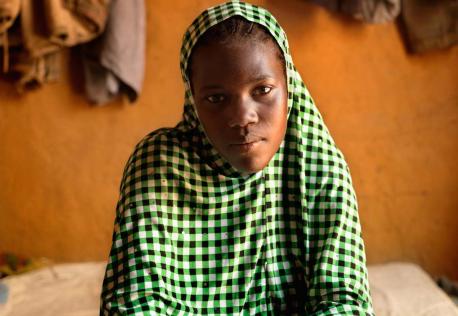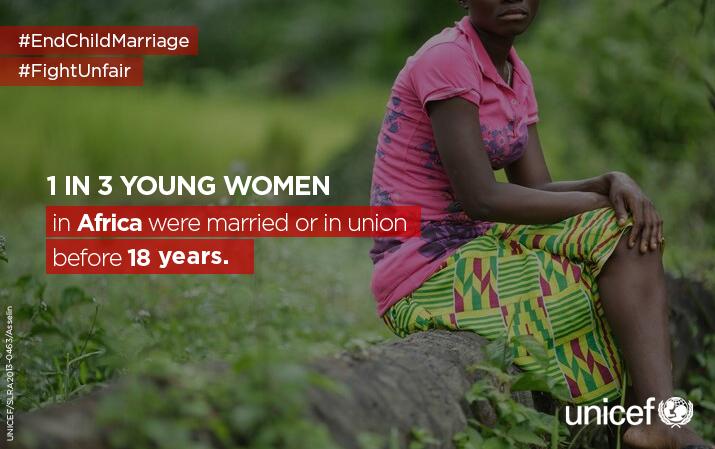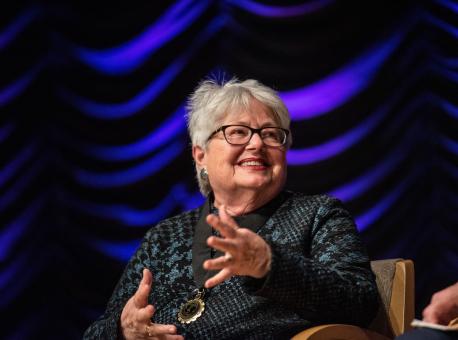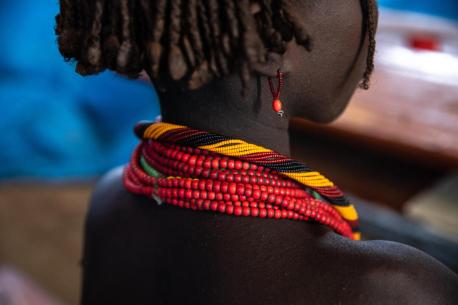
1 Billion Girls. That's Why We Must End Child Marriage
UNICEF asks you to help fight for gender equity.
On International Women's Day 2016, we commend women's social, economic, cultural and political achievements worldwide. We have much to celebrate.
But progress toward gender parity has slowed in many places, with the persistence of child marriage one of the cruelest stumbling blocks.
“Choosing when and whom to marry is one of life's most important decisions." says Dr. Babatunde Osotimehin, Executive Director of UNFPA, the United Nations Population Fund. "Child marriage denies millions of girls this choice each year."
New program hopes to end child marriage
Today, UNICEF and UNFPA announced the Global Program to Accelerate Action to End Child Marriage. The effort, which will protect the rights of millions of vulnerable girls living in Africa, Asia and the Middle East, can't come soon enough.
"This is critical because if current trends continue, the number of girls and women married as children will reach nearly 1 billion by 2030," says UNICEF Executive Director Anthony Lake. His dire forecast, he says, means "1 billion childhoods lost, 1 billion futures blighted."
"The world has awakened to the damage child marriage causes to individual girls, their futures and to their societies," says Lake.
That suffering is particularly acute in Africa. A UNICEF report released last December at the African Union Girls Summit in Lusaka, Zambia, issued this warning: The total number of child brides could more than double from 125 to 310 million by 2050. The cause of this projected increase is the inability of the pace of African economic progress to offset rapid population growth projections.
The consequences, wherever child marriage rates are high, are disastrous for girls and the societies in which they live.
Child marriage is a violation of the rights of girls and women. Child brides are less likely to finish school and obtain the skills that could lift them out of poverty. Their children are more likely to be extremely underweight, arrive stillborn or die soon after birth.
When girls marry early, they suffer
Early marriage can also kill the girl herself. Child brides are far more likely to fall victim to violence and diseases like AIDS. And early pregnancy and childbirth are leading causes of maternal mortality.
The forces driving child marriage in Africa highlight the difficulties of ending the deeply entrenched practice. There, the legal marriage age is 18, but poverty drives parents to break those laws, with long-standing traditions providing cover. In the poorest regions, child marriage rates haven't changed since 1990.
"I was still a little girl, and I wanted to study." — Florence, 14, DR Congo
Social norms are a major culprit, rooted in gender inequality and discrimination.
Last May, the African Union launched a continent-wide campaign to End Child Marriage. Strengthening laws prohibiting underage marriage and policies that protect girls’ rights is a key part of the plan.
UNICEF is doing its part in Africa, helping to organize the End Child Marriage campaigns and working at the grassroots level to change families’ minds about marrying off their daughters.
The new UNFPA-UNICEF initiative will extend that help to girls everywhere. Increasing economic support to families, enforcing 18 as the minimum legal marriage age and, most importantly, ensuring girls have access to education are all part of the plan.

As UNICEF programs to promote girls’ school enrollment and retention have shown, keeping girls in school can tip the scales.
When 14-year-old Florence’s stepmother tried to marry her off last year, she refused: “I was still a little girl, and I wanted to study,” she says. Angered, her stepmother took her to the market and abandoned her there. Florence didn’t try to go home. Instead, she found a way to stay in school.
Now she has big plans for her future. “I want to go to high school and then become a tradeswoman. It was a good decision.”
Stay updated on UNICEF’s progress in helping to end child marriage by following us on Facebook, Twitter or Instagram.
Take the pledge for equality — help protect girls from discrimination.
HOW TO HELP
There are many ways to make a difference
War, famine, poverty, natural disasters — threats to the world's children keep coming. But UNICEF won't stop working to keep children healthy and safe.
UNICEF works in over 190 countries and territories — more places than any other children's organization. UNICEF has the world's largest humanitarian warehouse and, when disaster strikes, can get supplies almost anywhere within 72 hours. Constantly innovating, always advocating for a better world for children, UNICEF works to ensure that every child can grow up healthy, educated, protected and respected.
Would you like to help give all children the opportunity to reach their full potential? There are many ways to get involved.





